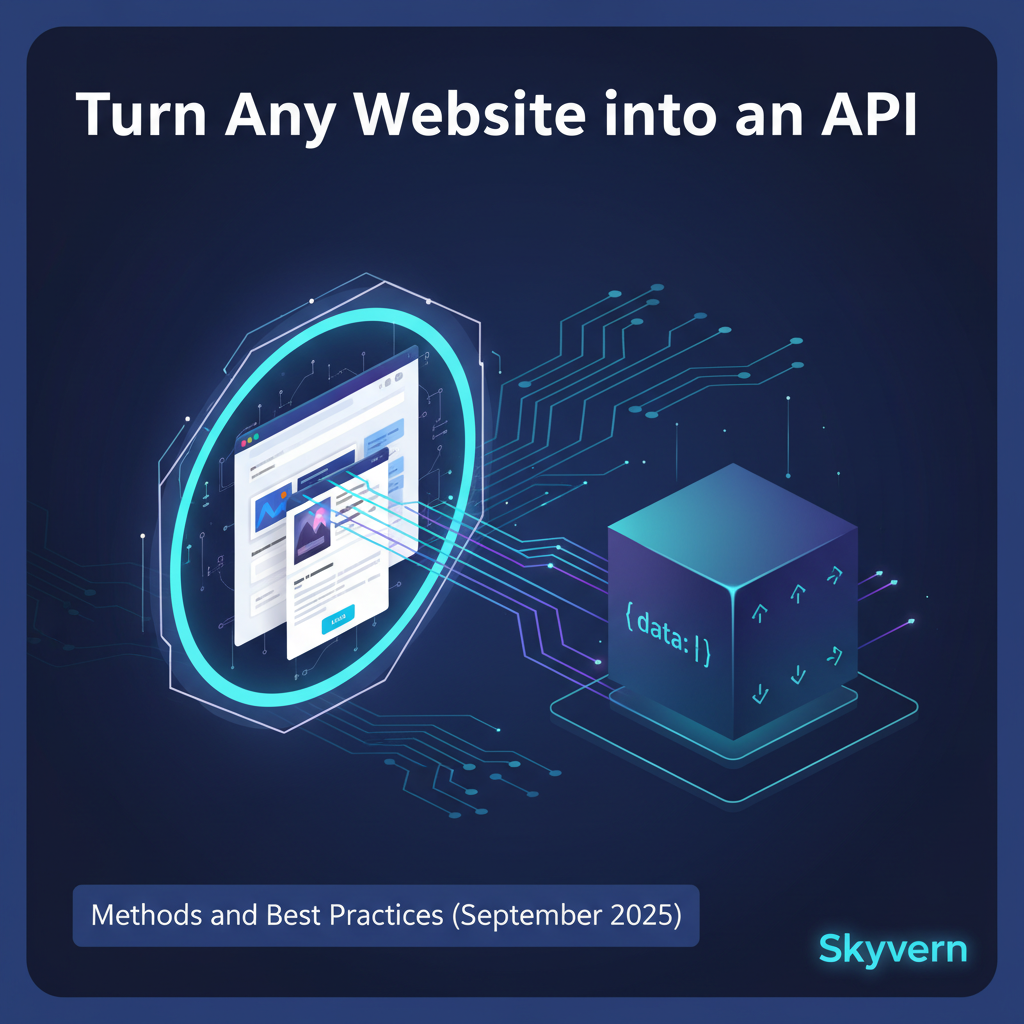Turn Any Website into an API: Methods and Best Practices (September 2025)

You're stuck with a website that has no API, and you need data from it regularly. The frustrating reality is that most websites still don't offer APIs, but the good news is that modern web scraping platforms can fill the gap. Let's break down the methods that actually work and the best practices that'll save you from building something that breaks every time the website changes.
TLDR:
- You can turn any website into an API using AI-powered browser automation, even without native APIs
- Traditional scraping breaks with website changes, but LLM-powered tools adapt automatically
- Skyvern handles complex scenarios like 2FA, CAPTCHAs, and changing content reliably
- Modern API creation requires security, scaling, and authentication handling for production use
- Browser automation with computer vision removes brittle selectors that break constantly
What Makes a Website API-Ready
Traditional websites vary widely in their API readiness. E-commerce sites often provide strong APIs for product catalogs and inventory, while informational sites may offer limited or no API access. The weather report, ocean tide schedule, news feeds and other content that comes up in a web search is typically generated through search engine APIs to connect with varied service providers.
Other services such as Google Maps use an API to let users search locations or plan routes. This shows how APIs have become the backbone of modern web interactions.
The reality is that most websites weren't built with programmatic access in mind, creating a massive gap between what businesses need and what's available. Sound familiar?
Skyvern's approach differs from traditional API integration by automatically scraping data from any website through intelligent browser automation. Rather than waiting for websites to provide APIs, Skyvern changes any web interface into a programmable endpoint using LLM-powered automation.
This means you can create reliable integrations with websites that would otherwise require manual interaction or fragile scraping scripts.
The World of Existing Web APIs
REST APIs dominate the modern web due to their simplicity and stateless nature. These are the most popular and flexible APIs found on the web today.
Financial and payment APIs represent some of the most mature API implementations. It's common for a bank to rely on an API to connect remote users to the bank's back-end systems for remote deposits, balance checks, transfers and electronic payments.
And yet, many websites still lack complete APIs. Sound familiar? If you've ever tried to automate interactions with these websites, you know exactly how challenging this gets.
For businesses dealing with websites that lack APIs, Skyvern provides a solution by creating API-like interfaces through intelligent browser automation. Instead of waiting for third-party websites to build APIs, organizations can immediately start programmatically accessing any website's functionality.

Whether you need to automate form filling or handle complex purchasing workflows, Skyvern makes it possible to create reliable API endpoints from any website.
Web Scraping as an API Alternative
Traditional web scraping faces major challenges in September 2025. Real talk: the modern web is a hostile environment for data extraction. Websites use sophisticated anti-bot measures, JavaScript-heavy interfaces, and ever-changing layouts, making traditional web scraping feel like trying to shovel in a snowstorm.
Skyvern changes traditional web scraping by using computer vision and LLMs to understand websites like humans do. No more brittle selectors. Skyvern adapts to layout changes automatically, making it ideal for creating reliable API endpoints from any website.
This approach works particularly well for government websites and complex invoice downloading workflows that traditional scraping tools can't handle reliably.
Browser Automation for API Creation
Traditional browser automation faces critical limitations that make it unreliable for API creation. The biggest issue is brittleness: scripts break whenever websites update their layouts, change element IDs, or modify their structure. XPath-based interactions are particularly problematic because they depend on specific HTML hierarchies.
Traditional Tool | Main Limitation | Impact on API Creation |
|---|---|---|
Selenium | Brittle XPath selectors | Breaks with website changes |
Playwright | Complex setup requirements | High maintenance overhead |
Puppeteer | Limited to Chromium | Reduced compatibility |
Cypress | Testing-focused design | Not optimized for production APIs |
Skyvern solves fundamental limitations that plague traditional browser automation tools. Skyvern's LLM-powered approach adapts automatically to layout changes and new websites.
This makes it possible to create API endpoints that remain functional even as target websites evolve. Whether you're dealing with archived data or complex job application workflows, Skyvern maintains reliability where traditional tools fail.
Best Practices for Website API Implementation
As the web has evolved over time, the hurdles for traditional web scraping technologies have grown progressively greater. Many websites now make use of a mix of authentication barriers, security challenges, and changing layouts. We've seen scraping scripts throw errors for edge cases in any one of these scenarios, far too many times.
So yeah, error handling becomes particularly important when dealing with changing web content. The key API benefits include reliability (reduced blocking), simplicity (no need to maintain web scraping infrastructure), and scalability (built-in handling of concurrent requests).
Authentication and rate limiting require special consideration when creating API endpoints from websites. These security hurdles can be real pain points when you're dealing with scraping data from the modern web using traditional tools.
Skyvern adapts to these security practices by design, providing built-in authentication handling and automatic retry mechanisms. The system handles complex scenarios like CAPTCHA solving and multi-factor authentication, making it possible to create reliable API endpoints from even the most complex websites.

Handling Changing Content and Modern Web Apps
Modern web applications present unique challenges for API creation. Browser-based web scraping is becoming increasingly important as websites adopt complex JavaScript frameworks and changing content loading. Tools that can fully display and interact with modern web applications are important.
Single-page applications (SPAs) and dynamic content loading complicate traditional scraping approaches because content often appears asynchronously after the initial page load, application state can change without a full refresh, user interactions may involve multi-step workflows and conditional logic, and real-time updates can alter what’s displayed based on user actions or external data.
Traditional scraping tools struggle with these scenarios because they can't wait for changing content or understand complex user flows.
Skyvern excels at handling changing content through its advanced browser automation features. The system can wait for JavaScript to load, interact with changing elements, and handle complex user flows that span multiple pages or require user authentication, making it ideal for modern web applications.
This makes it possible to create reliable integrations with even the most complex modern websites.

Security and Authentication Considerations
Security becomes critical when creating API endpoints that interact with third-party websites on behalf of users. Authentication handling requires sophisticated approaches when dealing with different website login systems. Skyvern supports a number of different authentication methods to make it easier to automate tasks behind a login, such as:
- Credential management: Never store passwords in plain text
- Session handling: Properly manage login sessions and timeouts
- Data encryption: Encrypt sensitive data in transit and at rest
- Access controls: Implement proper authorization mechanisms
- Audit logging: Track all automated activities for compliance
The API security trends reflects the growing importance of these considerations in production environments.
Skyvern handles security concerns through enterprise-grade features including SOC 2 compliance, secure credential management, and encrypted data handling. We never stores user credentials permanently and provides audit trails for all automated activities.
Scaling and Performance Optimization
Scaling API endpoints created from websites requires careful consideration of performance bottlenecks and resource management. The key API benefits include reliability (reduced blocking), simplicity (no need to maintain web scraping infrastructure), and scalability (built-in handling of concurrent requests). However, API services usually operate on a paid model based on the number of requests or amount of data scraped.
Resource management and load balancing help maintain consistent performance under varying loads. Skyvern Cloud is a managed cloud version of Skyvern that allows you to run Skyvern without worrying about the infrastructure. It allows you to run multiple Skyvern instances in parallel and comes bundled with anti-bot detection mechanisms, proxy network, and CAPTCHA solvers.
Scaling website APIs requires handling more requests while maintaining reliability and performance as complexity increases.
Skyvern's cloud infrastructure provides built-in scaling features with parallel execution, proxy management, and intelligent retry mechanisms. This guarantees consistent performance even when dealing with complex websites or high request volumes.

FAQ
What's the main difference between traditional automation tools and AI-powered solutions?
Traditional tools rely on brittle XPath selectors that break whenever websites update their layouts, requiring constant maintenance. AI-powered solutions like Skyvern use computer vision and LLMs to understand websites like humans do, automatically adapting to layout changes without requiring code updates.
When should I consider switching from manual website interactions to automated API endpoints?
If you're spending more than a few hours per week on repetitive website tasks, dealing with multiple similar websites, or need to scale operations beyond what manual processes can handle, automated API endpoints become cost-effective and reliable alternatives.
Can I create APIs for websites that require authentication and 2FA?
Yes, modern automation platforms can handle complex authentication scenarios including multi-factor authentication, CAPTCHA solving, and session management. This makes it possible to create API endpoints even for secure, login-protected websites.
How long does it typically take to implement a website API solution?
Skyvern can often create working API endpoints with no custom code at all, even on websites it’s never seen before. In many cases, workflows run successfully on the first attempt, turning hours or weeks of manual scripting into a matter of minutes. When refinement is needed, Skyvern still eliminates the heavy development cycles and keeps automations running by adapting automatically as websites change.
Final thoughts on converting websites into APIs
The gap between what websites offer and what businesses need continues to grow, but you don't have to wait for every site to build their own API. Modern browser automation has evolved beyond brittle scraping scripts that break with every website update. Skyvern uses AI to understand websites like humans do, creating reliable API endpoints that adapt automatically to changes. Your team can finally automate those repetitive web tasks without constantly fixing broken code.

